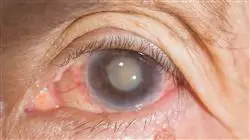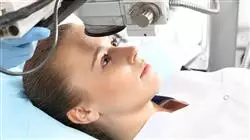University certificate
The world's largest faculty of medicine”
Introduction to the Program
This Advanced master’s degree in Ophthalmologywill allow you to acquire advanced knowledge and will be of great use in improving the visual health of your patients”

Sciences related to Vision such as Optics, Optometry, Ocular Pharmacology, and Ophthalmology have experienced spectacular progress over the last ten years, together with significant technological development in the field. There have been noteworthy advances in treatment of pathologies that, until recently, were major causes of blindness, such as cataracts, glaucoma, and alterations and degeneration of the retina and the macula.
Therefore, the subspecialization of professionals in this field is of great relevance to improving the health of people suffering from any visual pathology. To increase the training of ophthalmologists, TECH offers an educational proposal of high academic value: the Advanced master’s degree in Ophthalmology. A program that, due to its size, has been distributed intov two large modules. In this way, the student will firstly enter into the study of clinical ophthalmology, to continue with a specific program on the pathology and surgery of the macula, retina and vitreous.
Thus, the program includes everything from cataract surgery, oculoplasty and tear ducts to glaucoma and ophthalmopediatrics. It also deals in depth with all the subspecialties of the retina, delving deeply into other major issues, such as AMD (Age-Related Macular Degeneration). In this case, the specific topics on surgery provide an additional value to this entire educational project, whose main objective is to offer a higher specialization and high academic level to promote the need of these professionals to study and increase their professional training.
This Advanced master’s degree offers the possibility to deepen and update knowledge of this subject, with the use of the latest educational technology. It offers a global vision of Ophthalmology while focusing on the most important and innovative aspects of the macula, retina and vitreous. All of this in a 100% online specialization course, which allows students to expand their knowledge and, therefore, their professional skills and competencies in a simple way, adapting the study time to fit in with the rest of their daily commitments.
Our Advanced master’s degree is a unique opportunity to study the most relevant aspects of Ophthalmology in one single program, providing you with the best training to boost your career"
This Advanced master’s degree in Ophthalmology contains the most scientific and up-to-date program on the market. The most important features include:
- The development of clinical practical case studies presented by experts in Ophthalmology
- The graphic, schematic, and eminently practical contents with which they are created, provide scientific and practical information on the disciplines that are essential for professional practice
- Latests diagnostic and therapeutic developments in Ophthalmology
- The presentation of hands-on workshops on procedures, diagnostic and therapeutic techniques
- Real images in high resolution and practical exercises where the self-evaluation process can be carried out to improve learning
- An algorithm-based interactive learning system for decision-making in the clinical situations presented throughout the course
- Special emphasis on test-based medicine and research methodologies
- Theoretical lessons, questions to the expert, debate forums on controversial topics, and individual reflection assignments
- Content that is accessible from any fixed or portable device with an Internet connection
This Advanced master’s degree is the best investment you can make when choosing a refresher program for two reasons: in addition to expanding your knowledge in Ophthalmology, you will obtain a degree endorsed by TECH"
Forming part of the teaching staff is a group of professionals in the world of psychiatry, who bring their work experience to this course, as well as a group of renowned specialists recognized by esteemed scientific communities.
The multimedia content, developed with the latest educational technology, will provide the professional with situated and contextual learning, i.e., a simulated environment that will provide an immersive training program designed to train in real situations.
This program is designed around Problem Based Learning, whereby the doctor must try to solve different professional practice situations that arise during the program. For this purpose, the physician will be assisted by an innovative interactive video system developed by renowned experts in the field of ophthalmology who have extensive teaching experience.
Increase your decision-making confidence by updating your knowledge through this Advanced master’s degree: A program created to train the best"

We offer the best teaching methodology, with a multitude of practical content which will allow you to study in more complete and effective way"
Why study at TECH?
TECH is the world’s largest online university. With an impressive catalog of more than 14,000 university programs available in 11 languages, it is positioned as a leader in employability, with a 99% job placement rate. In addition, it relies on an enormous faculty of more than 6,000 professors of the highest international renown.

Study at the world's largest online university and guarantee your professional success. The future starts at TECH”
The world’s best online university according to FORBES
The prestigious Forbes magazine, specialized in business and finance, has highlighted TECH as “the world's best online university” This is what they have recently stated in an article in their digital edition in which they echo the success story of this institution, “thanks to the academic offer it provides, the selection of its teaching staff, and an innovative learning method aimed at educating the professionals of the future”
A revolutionary study method, a cutting-edge faculty and a practical focus: the key to TECH's success.
The most complete study plans on the university scene
TECH offers the most complete study plans on the university scene, with syllabuses that cover fundamental concepts and, at the same time, the main scientific advances in their specific scientific areas. In addition, these programs are continuously being updated to guarantee students the academic vanguard and the most in-demand professional skills. In this way, the university's qualifications provide its graduates with a significant advantage to propel their careers to success.
TECH offers the most comprehensive and intensive study plans on the current university scene.
A world-class teaching staff
TECH's teaching staff is made up of more than 6,000 professors with the highest international recognition. Professors, researchers and top executives of multinational companies, including Isaiah Covington, performance coach of the Boston Celtics; Magda Romanska, principal investigator at Harvard MetaLAB; Ignacio Wistumba, chairman of the department of translational molecular pathology at MD Anderson Cancer Center; and D.W. Pine, creative director of TIME magazine, among others.
Internationally renowned experts, specialized in different branches of Health, Technology, Communication and Business, form part of the TECH faculty.
A unique learning method
TECH is the first university to use Relearning in all its programs. It is the best online learning methodology, accredited with international teaching quality certifications, provided by prestigious educational agencies. In addition, this disruptive educational model is complemented with the “Case Method”, thereby setting up a unique online teaching strategy. Innovative teaching resources are also implemented, including detailed videos, infographics and interactive summaries.
TECH combines Relearning and the Case Method in all its university programs to guarantee excellent theoretical and practical learning, studying whenever and wherever you want.
The world's largest online university
TECH is the world’s largest online university. We are the largest educational institution, with the best and widest online educational catalog, one hundred percent online and covering the vast majority of areas of knowledge. We offer a large selection of our own degrees and accredited online undergraduate and postgraduate degrees. In total, more than 14,000 university degrees, in eleven different languages, make us the largest educational largest in the world.
TECH has the world's most extensive catalog of academic and official programs, available in more than 11 languages.
Google Premier Partner
The American technology giant has awarded TECH the Google Google Premier Partner badge. This award, which is only available to 3% of the world's companies, highlights the efficient, flexible and tailored experience that this university provides to students. The recognition as a Google Premier Partner not only accredits the maximum rigor, performance and investment in TECH's digital infrastructures, but also places this university as one of the world's leading technology companies.
Google has positioned TECH in the top 3% of the world's most important technology companies by awarding it its Google Premier Partner badge.
The official online university of the NBA
TECH is the official online university of the NBA. Thanks to our agreement with the biggest league in basketball, we offer our students exclusive university programs, as well as a wide variety of educational resources focused on the business of the league and other areas of the sports industry. Each program is made up of a uniquely designed syllabus and features exceptional guest hosts: professionals with a distinguished sports background who will offer their expertise on the most relevant topics.
TECH has been selected by the NBA, the world's top basketball league, as its official online university.
The top-rated university by its students
Students have positioned TECH as the world's top-rated university on the main review websites, with a highest rating of 4.9 out of 5, obtained from more than 1,000 reviews. These results consolidate TECH as the benchmark university institution at an international level, reflecting the excellence and positive impact of its educational model.” reflecting the excellence and positive impact of its educational model.”
TECH is the world’s top-rated university by its students.
Leaders in employability
TECH has managed to become the leading university in employability. 99% of its students obtain jobs in the academic field they have studied, within one year of completing any of the university's programs. A similar number achieve immediate career enhancement. All this thanks to a study methodology that bases its effectiveness on the acquisition of practical skills, which are absolutely necessary for professional development.
99% of TECH graduates find a job within a year of completing their studies.
Advanced Professional Master's Degree in Ophthalmology
The technological advances developed and implemented in the field of the ocular specialty must be socialized and, therefore, in TECH Global University we have created this program of theoretical and practical professional updating. During the two years that this program requires, students will be able to broaden their knowledge about the pathologies that affect the retina, macula, choroid and vitreous, such as vascular, tumor, infectious, inflammatory and hereditary diseases. In addition, they will also delve into diseases of the pigment epithelium AND Bruch's membrane and Age-Related Macular Degeneration (AMD). By mastering these basics, they will be qualified to approach the surgical techniques necessary for the correct intervention of ocular trauma. In addition, the syllabus includes a set of contents focused on the presentation of recent findings in glaucoma, ocular surface, cornea, ophthalmopediatrics, oculoplasty and tear ducts. On a more technological note, inventions in cataract surgery are presented, specifically intraoperative guidance systems and femtosecond lasers.
Professional Master's Degree in Ophthalmology
Studying this TECH program is an important opportunity to obtain and develop the key diagnostic-prescriptive skills to carry out the procedures of this specialty. Thanks to the thematic axes and the methodology of case analysis, the professional will be able to face complex medical pictures, where he/she will boldly mobilize the available resources. The deep knowledge acquired will enable him/her, in turn, to quickly identify the symptomatology of ocular complications, which will allow him/her to intervene effectively in early and advanced stages. Gradually, then, the graduate in ophthalmology will be able to develop skills in risk anticipation, in order to plan action frameworks that facilitate the indication of personalized treatments and, in cases of lesser danger, to evaluate the possible implications in order to avoid them through a quick support to eventualities. All this, following the ethical-legal regulations of their daily medical/clinical practice and guaranteeing both the quality of the care provided and the patient's safety.







